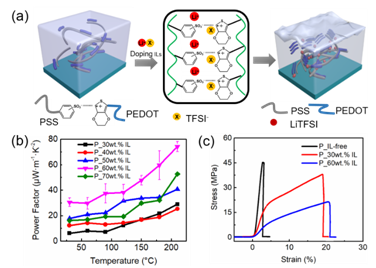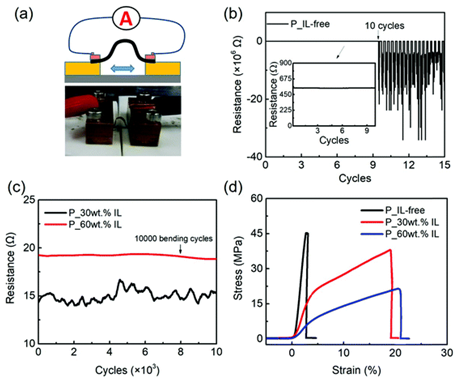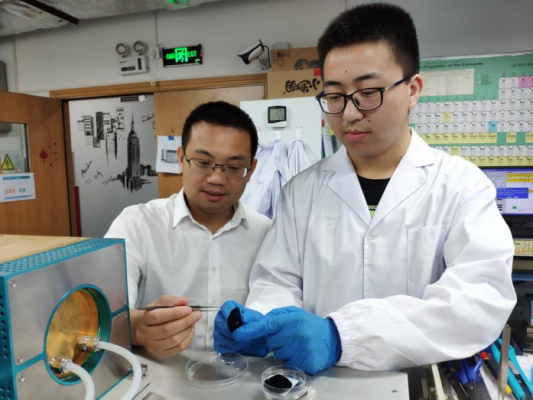Organic flexible thermoelectric films have received increasing attentions due to their ability to generate power for use in vigorous wearable electronics and internet of things (IoT) sensors. However, only high thermoelectric performance is not enough to manufacture flexible devices using organic thermoelectric materials. The practical flexibility of thermoelectric organic films has not yet received enough attention, with their degree of flexibility and tensile performances not yet adequately investigated.
Recently, Department of Materials Science and Engineering, Southern University of Science and Technology (SUSTech) had an inside cover paper published in internationally renowned academic journal, Journal of Materials Chemistry C. The paper was titled “Synergistic enhancement of thermoelectric and mechanical performances of ionic liquid LiTFSI modulated PEDOT flexible films.” The first author is 2014 undergraduate Qikai Li, who graduated last year. He was a member of Associate Professor Weishu Liu’s research team and associate Professor Weishu Liu is the corresponding author of this paper.
The paper was completed during the undergraduate years of Qikai Li, despite being published recently. His research is mainly about the systematically investigation of the effects of bis(trifluoromethane)sulfonimide lithium salt on the thermoelectric and mechanical performances of PEDOT:PSS. The authors obtained a synergistic enhancement of the electrical and mechanical flexibility.

PEDOT:PSS is one of the most widely investigated p-type conducting polymers due to its water solubility, light weight, and minimal environmental impacts. Usually, poly-styrenesulfonate (PSS) has been used as a water-soluble agent to make PEDOT soluble in water for versatile applications. However this development has come at the cost of decreased conductivity. For example, an optimized PEDOT:PSS thin film produces an electrical conductivity and a power factor that is 2 to 3 orders of magnitude less than that of conventional inorganic thermoelectric materials.
However, the IL-free PEDOT:PSS free-standing film would show an obvious brittle feature within only ten cycles in the bending performance test. Improving the flexibility or bendability of the film became a priority to solve.

After documents investigation, Qikai suggested an idea of using ionic liquids to enhance the inter- and intra- interactions between polymer chains which can improve both electrical transport performances. After ionic liquids treatments, the electrical conductivity of the IL-treated PEDOT:PSS films increased from 5 S cm-1 (IL-free PEDOT) to nearly 1000 S cm-1 (PEDOT with 60 wt% IL content). At the same time, the thermoelectric power factor of the PEDOT thin film was boosted by nearly two orders due to the modulated electrical conductivity and enhanced Seebeck coefficient with increased temperature. Mechanical bending tests also showed that the electrical conductivity change was less than 0.03% after 10000 bending cycles, far better than that of the IL-free film, suggesting good bendability. The tensile test showed that enhancements in the tensile strain of free-standing films improved from less than 3% to more than 20% before and after adding LiTFSI into PEDOT:PSS. The as-prepared IL/PEDOT:PSS thermoelectric films have promising applications for wearable electronics.
This work also received high evaluation from the reviewer:
“The authors fabricated flexible films using PEDOT:PSS modulated by ionic liquid LiTFSI and hence obtained both improved mechanical properties and TE power factor. They give a noteworthy point of view that the practical flexibility needs to get attention for application of organic thermoelectric materials”.
As a SUSTech graduate, Qikai Li joined Associate Professor Weishu Liu’s team in his junior year. He got excellent scientific and academic training at SUSTech and started to do research during his undergraduate years. After graduation, he joined the HKU-SUSTech joint Ph.D program.

At present, Associate Professor Weishu Liu and his team continue to work on the development of flexible thermoelectric film materials and devices with both mechanical flexibility and high thermoelectric performance. Dr. Liu mentioned that the relevant research results have been submitted for patent application and will be applied to the new electronic skin temperature perception simulation.
The film thermal conductivity test was conducted by Qinglin Jiang of South China University of Technology (SCUT). Research Assistant Manjiao Deng and 2016 postgraduate student Shuangmeng Zhang also made important contributions to this research. Dr. Liu also extends his gratitude towards Qinglin Jiang from SCUT for the film thermal conductivity testing. It also represents excellent cooperation between universities in the Greater Bay Area to boost science and technology development with the region.
This research was supported by the Guangdong Innovative and Entrepreneurial Research Team Program, the Shenzhen DRC project, the Shenzhen Peacock Talent Plan, and the Centers for Mechanical Engineering Research and Education at MIT and SUSTech.
Original paper:
https://pubs.rsc.org/en/Content/ArticleLanding/2019/TC/C9TC00310J






